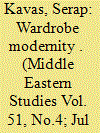|
|
|
Sort Order |
|
|
|
Items / Page
|
|
|
|
|
|
|
| Srl | Item |
| 1 |
ID:
142753


|
|
|
|
|
| Summary/Abstract |
In the Ottoman state, mining was important for the conduct of war, mints, public works, crafts industry, and financing the centralized administration system. In the republican period, mines were also important in the state's industrialization project, and they were used to subsidize the developing industries through provision of low-cost raw materials. These policies of the Ottoman and Turkish states had serious consequences for mine labour. Analysis of the Ottoman mining industry in the classical and post-classical periods, and also during the Turkish Republican period, highlights a range of emerging patterns. These include the strict control of the production by the state, the common practice of subcontracting, the role of foreign capital in the history of mining, the village-based division of labour around the mines, the use of peasant cultivator miners, the exploitation of unfree labour, the lack of investment, and traditional labour-intensive working conditions. The concept of ‘development and persistence’ is invaluable in explaining the longevity and extent of these practices stemming from historical circumstances, and we can see the persistence of some of these practices during the Republican period, despite the changes in the political regime and economic development. Throughout, the miners have been in a vulnerable position in relation to the state, exacerbated by their ambiguous peasant-miner position as wage labourers.
|
|
|
|
|
|
|
|
|
|
|
|
|
|
|
|
| 2 |
ID:
139306


|
|
|
|
|
| Summary/Abstract |
To a social thinker who is used to dealing with macro aspects of sociopolitical phenomena,
the issue of clothing may sound trifling, or at best may be viewed as an insignificant detail of social life and thus be discounted as secondary. However, what are considered mundane issues may themselves be so heavily loaded and may bear such subtle and unique meanings that inattention to them may result in missing some very important insights allowing a much closer analysis of larger issues, such as the experience of modernization, in particular, in a non-western context. As Comaroff and Comaroff rightly put it, ‘Cultural revolutions usually rooted themselves on modest terrain, in simple acts of fabrication, use, exchange. Even the most elaborate social formations arise from such quotidian acts’.
|
|
|
|
|
|
|
|
|
|
|
|
|
|
|
|
|
|
|
|
|